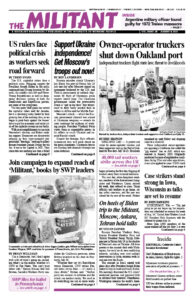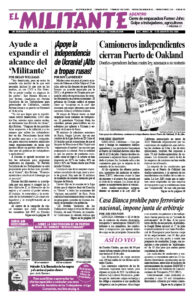Russian President Vladimir Putin, Iranian President Ebrahim Raisi and Turkish President Recep Tayyip Erdogan met in Tehran July 19, in the shadow of Moscow’s war on Ukraine. All three powers at the summit clash with Washington, but each has its own conflicting interests, including over rival military interventions in Syria, relations with Israel and over the Kurds.
The summit in Iran’s capital took place days after President Joseph Biden ended his trip to Israel and Saudi Arabia. His meetings illustrated the U.S. rulers’ weakened position, and garnered little to advance their interests. Nonetheless, Washington remains the world’s dominant imperialist power with vast military might deployed across the region.
For Putin, shunned by many governments after he launched his murderous war against Ukraine, the Tehran summit was intended to paint a picture of Moscow as a world power, including for domestic consumption, and to push back against efforts by Washington and other imperialist powers to isolate it.
Putin admitted to Iranian officials that U.S.-led sanctions had created “colossal” difficulties and hoped the trip would cement ties with Iran. The counterrevolutionary regime in Tehran has intervened in conflicts in Syria, Iraq, Lebanon and Yemen. Like Moscow, it is subject to sanctions levied by Washington. The Russian government is dangling the prospect of grain deliveries to Iran, whose population has been hit hard by food price inflation.
Iran’s Ayatollah Ali Khamenei welcomed Putin, stating support for his war in Ukraine. But Tehran denied it would supply Moscow with drones.
Hours before Putin’s arrival in Tehran, the National Iranian Oil Company and Russian state-owned gas producer Gazprom signed a deal worth $40 billion in offshore gas projects and a pipeline agreement. Iran’s capitalist rulers are especially keen to boost their relations with Moscow, even as friction between Iran and Russia rises, with Russian oil traders aggressively undercutting Iranian counterparts in sales to China.
Erdogan went to the summit pressing Moscow and Tehran to support a new offensive he’s threatening in northern Syria against Kurdish militants. The operation’s goal is to deal blows to the autonomous zone carved out by the Kurds, an oppressed people who have been denied their own homeland by the rulers of Iraq, Iran, Syria and Turkey.
Erdogan got nowhere. Both Moscow and Tehran said no.
Turkey straddles the mouth of the Black Sea, a key trading route for both Ukraine and Russia. The Turkish rulers have the second-largest army in the U.S.-led NATO alliance, and are casting themselves as mediators in the Ukraine war. The Turkish government and U.N. officials brokered a deal between Moscow and Kyiv July 22 in an effort to clear the way for exporting millions of tons of Ukrainian grain, as well as Russian grain and fertilizer.
Erdogan condemned Moscow’s invasion but kept the door open for talks with Putin. Turkey is now a prime destination for Russians unable to access financial services in the U.S. and Europe.
At the same time, weapons manufacturers in Turkey are increasing the supply of drones and military-grade protective gear to the Ukrainian army.
Since 2016 the Turkish rulers have launched four military incursions into Syria, where Tehran and Moscow provided decisive military force to prop up the regime of Bashar al-Assad during Syria’s civil war. The Turkish government backs Islamist forces opposed to Assad. Moscow used its intervention in Syria to secure greater control of the port of Tartus on the Mediterranean Sea, a key base for its naval forces, and to strengthen its political hand against the U.S. and other rivals.
Washington keeps 900 soldiers in Syria, to protect its interests in that country’s oil fields that the Kurdish-led Syrian Democratic Forces control.
Sharp differences over Israel
One of the sharpest differences between the three powers taking part in the summit is over relations with Israel.
The Iranian regime openly calls for the destruction of Israel and expulsion of Jews. It gives aid to Hezbollah in Lebanon and Hamas in Gaza, both of which carry out attacks on Israel. Tehran also continues its long-term effort to develop nuclear weapons.
The Israeli government maintains relations with Putin, as it carries out airstrikes in Russian-controlled Syrian airspace targeting Tehran-backed militias and missile bases, without retaliation from Moscow.
In the last year Erdogan has sought to restore relations with the governments of Saudi Arabia, United Arab Emirates and Israel. Last month he hosted and met with Israeli Prime Minister Yair Lapid.
Just days after the summit the Russian and Turkish governments announced new talks, set for Sochi, Russia, Aug. 5, this time without Tehran.

